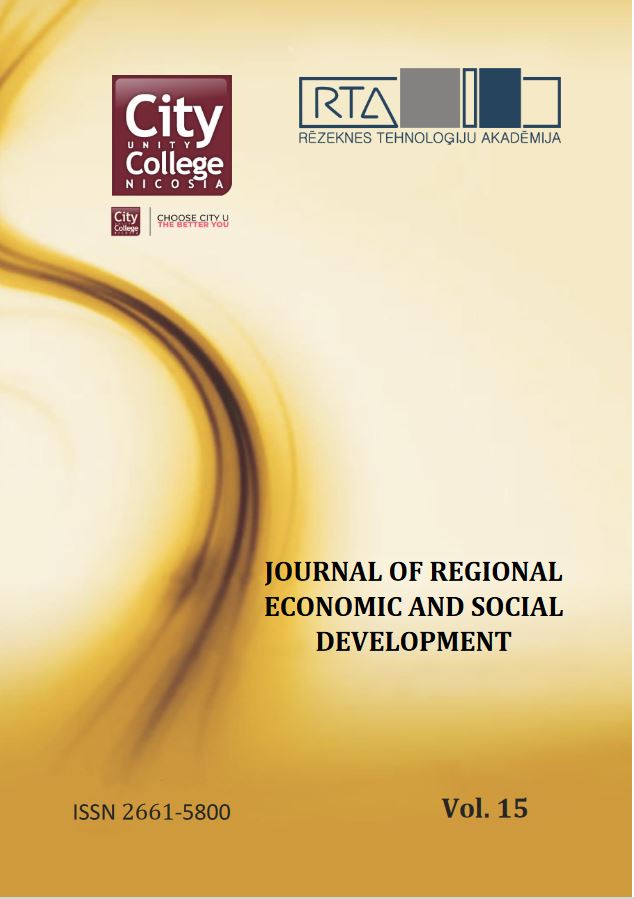GENDER DISCRIMINATION IN YOUTH EMPLOYMENT: A CASE STUDY IN GERMANY
DOI:
https://doi.org/10.17770/jresd2023vol15.7335Keywords:
disadvantaged youth, employment, engineering, exposure, gender discrimination, observation, youthAbstract
Purpose and aim of the study: The paper aim is to analyse qualitatively youth gender-based discrimination in employment.
Design / Methodology / Approach: The methodology of the exploratory case study research was employed in this work. The method of data collection was observation. Observation was chosen as it is an effective method of collecting qualitative data for building an adequate picture related to the phenomenon’s investigation. The obtained data were processed via pedagogical interpretation. The data were summarised.
Main Findings: The young engineering specialists have not been affected by gender based discrimination in employment. This finding based on the qualitative study is in accordance with the quantitative data received from the recently implemented survey questionnaire in selected countries of the European Union.
Originality: The originality of the paper is shown by qualitative analysis of youth gender-based discrimination in employment as there is a gap in such studies.
Implications: The scientific community could put more their efforts into the investigation of this significant topic.
Downloads
References
Adelman, I. (2000). Fifty Years of Economic Development: What Have we Learned? https://documents1.worldbank.org/curated/en/625131468761704307/pdf/28737.pdf
Ahrens, A., Purvinis, O., Zaščerinska, J., Micevičienė, D., & Tautkus, A. (2018). Burstiness Management for Smart, Sustainable and Inclusive Growth: Emerging Research and Opportunities. IGI Global. DOI: 10.4018/978-1-5225-5442-4.
Ahrens, A., Zascerinska, J., & Aleksejeva, A. (2021). Fostering External and Internal Sustainability within the English for Academic Purposes Course in the Covid-19 Pandemic. Education. Innovation. Diversity, 2(2), 6-15. https://doi.org/10.17770/eid2021.1.5412
Ahrens, A., Zascerinska, J., & Macovei, (2022a). EU Youth Beliefs in Gender Based Discrimination, Sexual Harassment and Sexual Assault. Education. Innovation. Diversity, 2(5), 47-57. https://doi.org/10.17770/eid2022.2.6963
Ahrens, A., Zascerinska, J., & Macovei, I. (2022b). A Comparative Study of Youth Gender Based Discrimination in Employment in Selected Countries. Current Issues of Business and Law, Nr.2, (3), 6-14. https://mokslomedis.lt/file/manual/NR.%202_2022_CIBL.pdf
Ahrens, A., Zascerinska, J., Macovei, I., Zascerinskis, M., & Aleksejeva, A. (2022). Building an assessment algorithm for measuring young employees’ gender based discrimination, sexual harassment and sexual assault: literature overview. In Proceedings of 9th International Scientific Conference Changes in Social and Business Environment CISABE'22, 3-12. Bologna, Italy: Editografica, EDlearning. http://www.edlearning.it/ebook/F915_Cisabe22.pdf
Deutsche Gesellschaft für Internationale Zusammenarbeit (GIZ) GmbH. (2021). Economic development and employment. https://www.giz.de/en/ourservices/economic_development_and_employment.html
EU Commission (2023). Employment and Social Developments in Europe 2023. Addressing labour shortages and skills gaps in the EU. Annual Report. https://ec.europa.eu/social/main.jsp?langId=en&catId=89&furtherNews=yes&newsId=10619
European Commission (EC). (2018). EU Youth Strategy. https://europa.eu/youth/strategy_en
Eurostat. (2023). Euro area unemployment at 6.4%. https://ec.europa.eu/eurostat/documents/2995521/17396142/3-31082023-BP-EN.pdf/24b6c427-dac2-84c2-618c-5981030f13bf#:~:text=In%20July%202023%2C%20the%20euro,from%206.1%25%20in%20July%202022.
Geertz, C. (1973). The Interpretation of Cultures. London: Hutchinson.
Mandalu, M. (2023). The Role of Youth in Economic Development. https://www.linkedin.com/pulse/role-youth-economic-development-martin-p-mandalu-ph-d-1f/
Organisation for Economic Co-operation and Development (OECD). (2022). Youth Employment. https://www.oecd.org/employment/youth/
Zainal, Z. (2007). Case study as a research method. Jurnal Kemanusiaan bil.9, Jun 2007.
Zaščerinska, J. (2013). Development of Students’ Communicative Competence within English for Academic Purposes Studies. Verlag: Mensch & Buch.
Zascerinska, J., Emet, S., Usca, S. & Bikova, A. (2023). STEM Education: A Comparative Study of Platforms in Selected Countries. Proceedings of 2023 International Interdisciplinary PhD Workshop (IIPhDW), 1-6. 10.1109/IIPhDW54739.2023.10124402.


